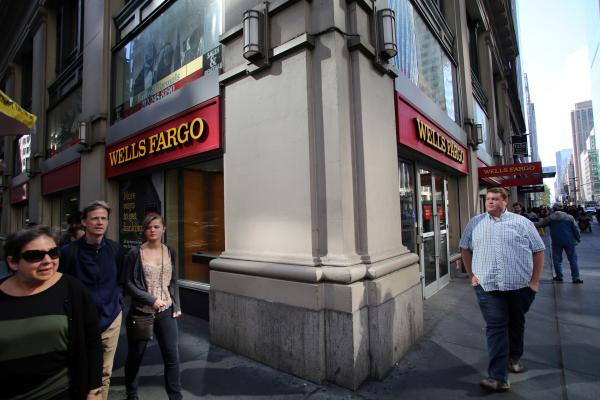I OPENED MY first savings account at Wells Fargo in Sacramento, Calif., when I was 8 years old. I remember the bronze stagecoach penny bank they gave me to help me practice saving. When I moved to Washington, D.C., I put my money into a D.C.-based bank, soon bought out by Wells Fargo. But it wasn’t the same Wells Fargo I’d grown up with.
In 2012, the Justice Department found Wells Fargo guilty of discriminating against both African-American and Latino borrowers during the subprime mortgage heist. It’s one of the top two banks invested in the Corrections Corporation of America, which is one of the largest for-profit prison companies in the U.S. In 2015, Wells Fargo was the world’s largest bank.
This fall, Wells Fargo CEO John Stumpf, who abruptly resigned in October, was called before a congressional investigative committee to answer accusations that thousands of Wells Fargo employees secretly opened 2 million fraudulent accounts without customers’ permission or knowledge, and were incentivized by the company to do so. Employees opened false banking and credit card accounts, transferred funds, and created phony access codes and email addresses. “The frauds violate federal and state statutes against bank fraud and identity theft,” William K. Black Jr., white-collar criminologist and cofounder of Bank Whistleblowers United, told Sojourners. Customers incurred charges and fines; in some cases, their credit ratings were damaged.
CEO Stumpf accepted “full responsibility for all unethical sales practices in our retail banking business.” (John Steinbeck once called this kind of thing a successful combination of “piracy and puritanism.”)
Wells Fargo claims that it has fired 5,300 people since 2011 related to these practices, but details are vague; the fraud investigators were hired by Wells Fargo. We don’t know how many were fired because they couldn’t fulfill the extortionate sales quotas.
Bank employees were “terrorized,” said Black. They were “viciously threatened—with getting fired—and not just occasionally: Four times a day they were called in on whether they had met their quotas.”
In the congressional hearings, Sen. Elizabeth Warren called Stumpf out, with the prophetic clarity of Isaiah. “You squeezed your employees to the breaking point,” said Warren, “so they would cheat customers and you could drive up the value of your stock and put hundreds of millions of dollars in your own pocket. And when it all blew up, you kept your job, you kept your multimillion-dollar bonuses, and you went on television to blame thousands of $12-an-hour employees who were just trying to meet cross-sell quotas that made you rich.”
Wells Fargo has agreed to settle out of court for $190 million—about $100 per alleged felony. “Anyone would gladly trade $100, with no admissions of fact and no guilty plea, to escape being prosecuted for a felony,” Black said.
The frauds are chump change, however, compared to the real moneymaker for senior executives: cross-selling junk products, which Wells Fargo does at more than twice the rate of its competitors.
Cross-selling is predatory “up-selling.” For example, if you’re already maxed out on two credit cards, Wells Fargo will offer you a third. If you keep bouncing checks, Wells Fargo will sell you overdraft protection. While interest rates are low, incentive is high to convert people to products with fees or higher interest rates.
Wells Fargo drives cross-selling, according to Black, “by precisely the same extortionate incentives that produced the frauds. In this environment the products being sold will frequently be harmful for the customer.”
ABOUT FIVE YEARS ago, I pulled all my money out of Wells Fargo. In my exit interview with the branch manager, I listed the reasons I thought Wells Fargo was acting as an unregulated scourge across the U.S. economy and preying on the economically vulnerable. He politely ushered me out.
Advent is a time to push back against what Walter Brueggemann calls “the data of despair,” a time to take actions that generate “narratives of hope.” I suggest exiting from Wells Fargo and its top investors: Berkshire, Vanguard, BlackRock, and Fidelity.
As for Mr. Stumpf, who left his position with a package of $134 million, I commend to him the words of Pope Francis: “Once capital becomes an idol and guides people’s decisions ... it destroys human fraternity [and] sets people against one another.”
If Jesus is your Lord and Savior, don’t let Wells Fargo hold your treasure.

Got something to say about what you're reading? We value your feedback!

